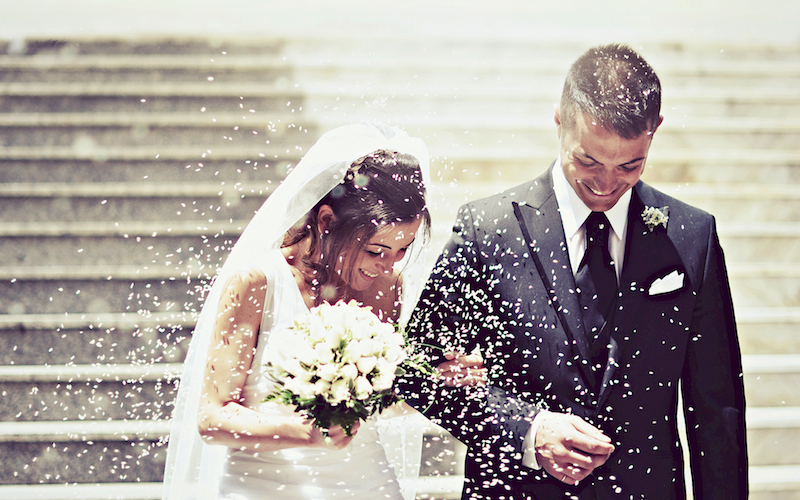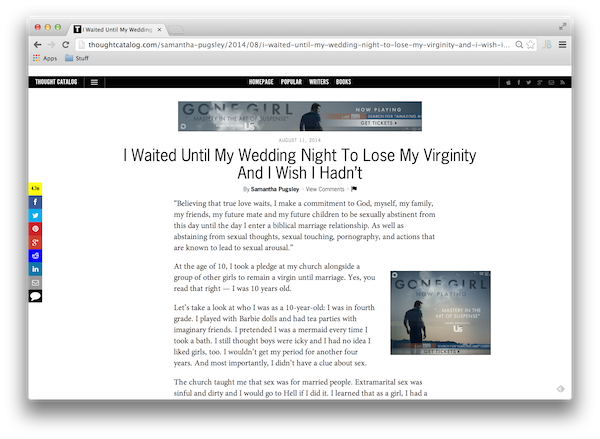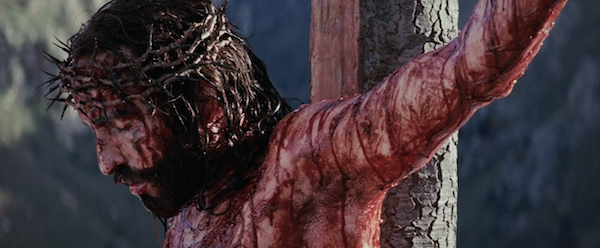In my previous post I began to talk about a post which I saw on Facebook written by a girl named Samantha. She was raised a Christian and remained a virgin until her wedding night, but now regrets her decision and has since left the Faith. In this post I would like to comment upon something which I noticed as I read her story…

Abstinence vs. Chastity
As I read Samantha’s article, I found the most striking feature of her narrative to be her repeated use, in some form or another, of the words “abstinence” and “virgin”. Now, since the article was about her decision to save sex until marriage, one might say that this is hardly surprising. However, to Catholics who have been formed in “Theology Of The Body”, this kind of language sets off alarms bells. You see, in Catholicism we draw very clear distinctions between those words and another word which will appear many times in this series, “chastity”.
If a guy tells me he is “abstinent”, it doesn’t really tell me a lot. All I can say for sure is that he currently isn’t having sex. What it doesn’t tell me is why. If he tells me he is a “virgin”, then I know that he has always been abstinent, but again it doesn’t tell me why… Maybe he has terrible breath? Maybe he’s a Star Trek nerd who serenades girls in Klingon on the first date? (This, by the way, is something I recommend saving exclusively for marriage)
So, the words “abstinence” and “virginity” really don’t tell us a whole lot. “Chastity”, on the other hand, tells us much more. Chastity is a virtue, in much the same way as honesty or courage. Chastity nurtures holiness and protects love from selfishness. If a man is pursuing the virtue of chastity, then he loves authentically, seeking the good of those whom he loves, even at the expense of his own convenience or immediate personal gratification.
Abstinence and virginity will tell me that a person doesn’t have sex, but it tells me very little else. For example, someone who is physically abstinent may, in fact, view women as objects of lust. Likewise, someone who is technically a virgin may have compromised himself by engaging in countless sexually arousing activities, even if it has never resulted in the full intercourse. This stands in stark contrast to chastity. Someone who is chaste does not view women as objects to be used, but rather as people to be loved. Someone who is chaste doesn’t seek for what he can get out of a relationship, but rather what he can give.
People often think that abstinence, virginity and chastity are the same thing. They are not. Not all virgins are chaste, and not all who are chaste are necessarily virgins. Both abstinence and virginity speak about the past, whereas chastity speaks about the present. For example, someone may have been involved in sexual relationships in high school, but has since decided to live a life of chastity. Not only that, even within marriage one is called to be chaste, to love husband or wife rightly. Abstinence may end with a wedding, but it is chastity which forges a strong marriage.
Samantha’s Formation
As I read through Samantha’s article, I got the impression that the distinctions described in the previous section were not present in this young girl’s formation. For example, here is how she spoke about her pledge:
“…I make a commitment…to be sexually abstinent from this day until the day I enter a biblical marriage relationship. As well as abstaining from sexual thoughts, sexual touching, pornography, and actions that are known to lead to sexual arousal.”
This is just a long list of “no”s. She promised to say “no” to this and “no” to that. Chastity isn’t a “no” to sex, but a “yes” to love, a seeking of authenticity in friendships, relationships and marriage.
Later in her article, Samantha outlined the twisted understanding of sexual purity which was presented to her:
“I learned that as a girl, I had a responsibility to my future husband to remain pure for him. It was entirely possible that my future husband wouldn’t remain pure for me, because he didn’t have that same responsibility, according to the Bible”
I consider myself pretty well-versed in various wacky beliefs held by different Christian groups, but I’ll admit I hadn’t heard this one before. Since when is purity just for girls?! Regardless, with this warped understanding of purity, Samantha described her dating life:
“I wondered where the line was because I was terrified to cross it. Was he allowed to touch my breasts? Could we look at each other naked? I didn’t know what was considered sexual enough to condemn my future marriage and send me straight to Hell”
As soon as one enters into this “How far can I go?” thinking, chastity has long since departed. When Samantha told her boyfriend that she was saving herself for marriage we are told that “he was fine with that because it was my body, my choice and he loved me”. If bodily autonomy was his main reason for not engaging with her sexually, then that’s a far cry from the virtue of chastity. If his motivation was chastity, then it would have been real love compelling him to postpone sex until marriage, in order that he could seek what was truly best for her and her future husband.
Part 1 | Part 2 | Part 3 | Part 4 | Part 5








